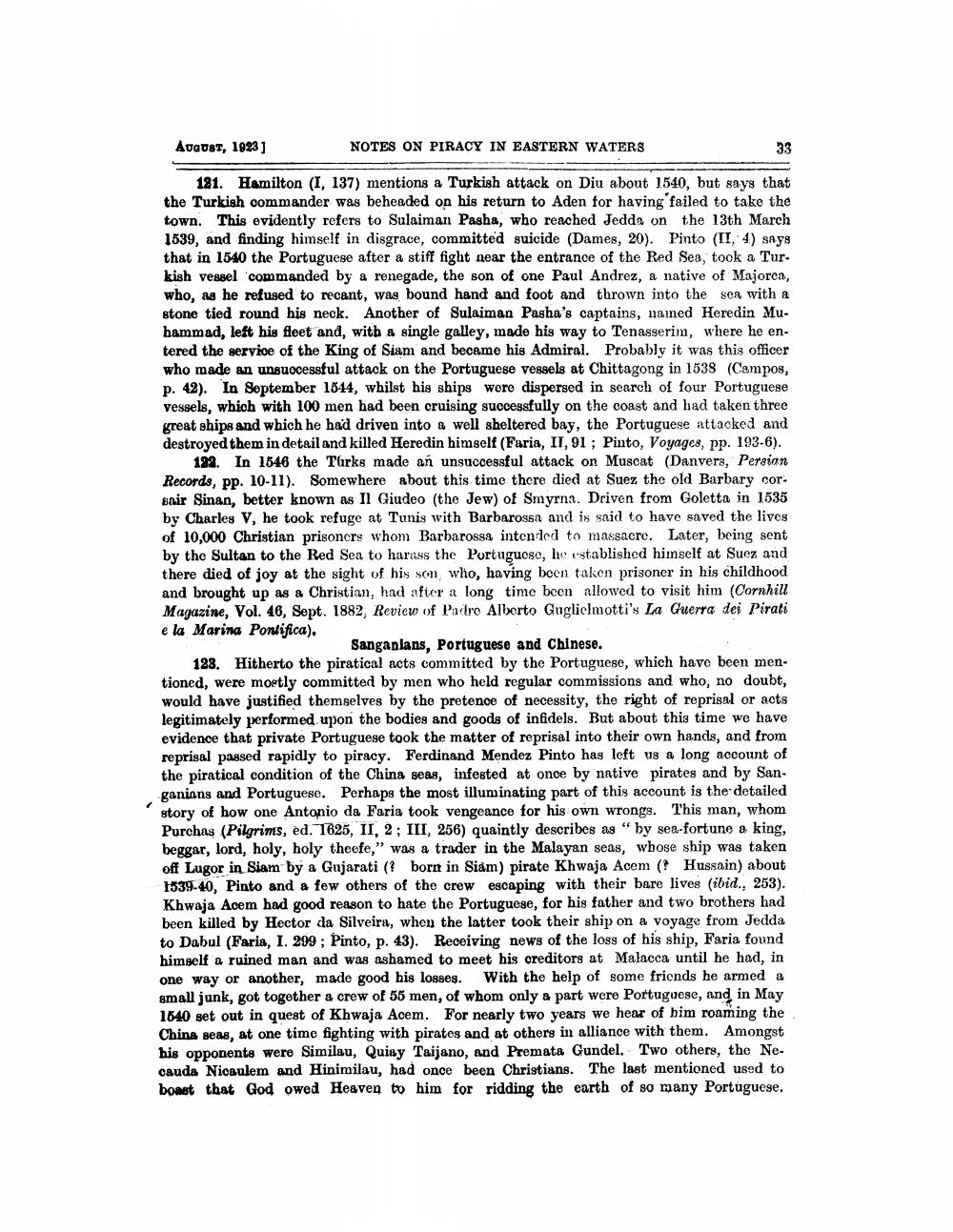________________
Adaust, 1923]
NOTES ON PIRACY IN EASTERN WATERS
181. Hamilton (I, 137) mentions a Turkish attack on Diu about 1540, but says that the Turkish commander was beheaded on his return to Aden for having failed to take the town. This evidently refers to Sulaiman Pasha, who reached Jedda on the 13th March 1539, and finding himself in disgrace, committed suicide (Dames, 20). Pinto (II, 4) says that in 1540 the Portuguese after a stiff fight near the entrance of the Red Sea, took a Tur. kish vessel commanded by a renegade, the son of one Paul Andrez, a native of Majorca, who, as he refused to recant, was bound hand and foot and thrown into the sea with a stone tied round his neck. Another of Sulaiman Pasha's captains, nained Heredin Muhammad, left his fleet and, with a single galley, made his way to Tenasserim, where he entered the service of the King of Siam and became his Admiral. Probably it was this officer who made an unsuccessful attack on the Portuguese vessels at Chittagong in 1538 (Campos, p. 42). In September 1814, whilst his ships were dispersed in search of four Portuguese vessels, which with 100 men had been cruising successfully on the coast and had taken three great ships and which he had driven into a well sheltered bay, the Portuguese attacked and destroyed them in detail and killed Heredin himself (Faria, IT, 91 ; Pinto, Voyages, pp. 193-6).
122. In 1646 the Turks made an unsuccessful attack on Muscat (Danvers, Persian Records, pp. 10-11). Somewhere about this time there died at Suez the old Barbary cor. bair Sinan, better known as Il Giudeo (the Jew) of Smyrna. Driven from Goletta in 1535 by Charles V, he took refuge at Tunis with Barbarossa and is said to have saved the lives of 10,000 Christian prisoners whom Barbarossa intended to massacre. Later, being sent by the Sultan to the Red Sea to harass the Portuguese, he established himself at Suez and there died of joy at the sight of his son, who, having been taken prisoner in his childhood and brought up as a Christian, had after a long time been allowed to visit him (Cornhill Magazine, Vol. 46, Sept. 1882, Review of Padre Alberto Guglielmotti's La Guerra dei Pirati e la Marina Pontifica).
Sangapians, Portuguese and Chinese. 128. Hitherto the piratical acts committed by the Portuguese, which have been mentioned, were mostly committed by men who held regular commissions and who, no doubt, would have justified themselves by the pretence of necessity, the right of reprisal or acts legitimately performed upon the bodies and goods of infidels. But about this time we have evidence that private Portuguese took the matter of reprisal into their own hands, and from reprisal passed rapidly to piracy. Ferdinand Mendez Pinto has left us a long account of the piratical condition of the China seas, infested at once by native pirates and by Sanganians and Portuguese. Perhaps the most illuminating part of this account is the detailed story of how one Antonio da Faria took vengeance for his own wrongs. This man, whom Purchas (Pilgrims, ed. 1625, II, 2 ; III, 256) quaintly describes as " by sea-fortune a king, beggar, lord, holy, holy theefe," was a trader in the Malayan seas, whose ship was taken off Lugor in Siam by a Gujarati ( born in Siam) pirate Khwaja Acem ( Hussain) about 1539-40, Pinto and a few others of the crew escaping with their bare lives (ibid., 253). Khwaja Acem had good reason to hate the Portuguese, for his father and two brothers had been killed by Hector da Silveira, when the latter took their ship on a voyage from Jedda to Dabul (Faria, I. 299; Pinto, p. 43). Receiving news of the loss of his ship, Faria found himself a ruined man and was ashamed to meet his creditors at Malacca until he had, in one way or another, made good his losses. With the help of some friends he armed a small junk, got together a crew of 55 men, of whom only a part were Portuguese, and in May 1640 set out in quest of Khwaja Acem. For nearly two years we hear of him roaming the China seas, at one time fighting with pirates and at others in alliance with them. Amongst his opponents were Similau, Quiay Taijano, and Premata Gundel. Two others, the Necauda Nicaulem and Hinimilau, had once been Christians. The last mentioned used to boast that God owed Heaven to him for ridding the earth of so many Portuguese.




